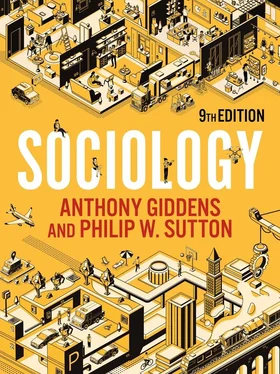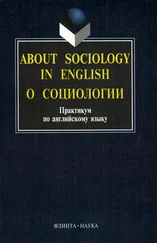Anthony Giddens on social reflexivity
Giddens has developed a theoretical perspective on the transformative changes happening in the present-day world (Giddens 2002, 2011). We live in what he calls a ‘runaway world’ marked by new risks and uncertainties of the sort outlined by Ulrich Beck (1999). Living in a digital, information age also means an increase in social reflexivity. Social reflexivity refers to the fact that we have constantly to think about, or reflect upon, the circumstances in which we live our lives.
When societies were shaped by custom and tradition, people could follow established ways of doing things in a more unreflective fashion. Today, many aspects of life that for earlier generations were simply taken for granted become matters of open decision-making. For example, for hundreds of years people had no effective ways of limiting the size of their families. With modern forms of contraception, and other forms of technological involvement in reproduction, parents can not only choose how many children they have but even decide what sex those children will be. These new possibilities, of course, are fraught with new ethical dilemmas.
Yet the idea of a runaway world does not imply that we have inevitably lost control of the future. In a global age, nations certainly lose some of the power they used to have. The 2008 financial crash demonstrated that individual governments have less influence over their national economies than once they had. But, as many governments acted collaboratively to formulate strategy and provide funds to assist the worst-hit countries, the crisis also showed that nations can work together to exert some influence.
Voluntary groups and social movements outside the framework of formal politics can also have an important role, but they will not supplant orthodox democratic politics. Democracy is still crucial, because these groups make divergent claims and have different interests – those who actively campaign for more tolerance of abortion and those who believe entirely the opposite, for instance. Democratic governments must assess and react to these varying claims and concerns.
Sociology as a discipline is not unaffected by these social changes, and sociologists are becoming more reflexive about their own research practice and its effects on participants. The divide between academic ‘experts’ and unknowledgeable ‘laypeople’ seems far less rigid today. Those who participate in interviews, focus groups, questionnaires, and so on, are increasingly included in other aspects of the research process – advising on appropriate questions, identifying ethical issues, and reading and commenting on draft research reports. This deeper involvement can enhance the validity of research findings, as sociologists can check their interpretations with participants before arriving at firm conclusions. On present trends it is likely that reflexivity will continue to spread to more areas of social life.
Ulrich Beck – risk in the second modernity
The German sociologist Ulrich Beck (1944–2015) also rejects postmodernism. Rather than living in a world ‘beyond the modern’, we are moving into a phase of what he calls ‘the second modernity’. Beck’s social theory of a ‘second modernity’ refers to the fact that modern institutions are becoming global, while everyday life is breaking free from the hold of tradition and custom. The old industrial society is disappearing and is being replaced by a ‘risk society’.
Beck is not arguing that the contemporary world is more risky than that of previous ages. Rather, it is the nature of the risks we must face that is changing. Risk now derives less from natural dangers or hazards than from our own social development and by the development of science and technology. For example, global warming represents possibly the most serious environmental issue today. Yet the scientific consensus is that this is not a simple natural disaster but the product of excessive greenhouse gases from industrial pollution and modern transportation emissions over the past 250 years. Popular science writers have dubbed such problems the ‘revenges of nature’.
The advance of science and technology creates new risk situations that are very different from those of previous ages. Science and technology obviously provide us with many benefits. Yet they create risks that are hard to measure. Thus no one quite knows what the risks involved in the development of new technologies, such as gene therapy or nanotechnology, might be. Supporters of genetically modified crops, for example, claim that at best they give us the possibility of ending malnutrition in the world’s poorest countries and providing cheap food for everyone. Sceptics claim that they could have dangerous, unintended health consequences.

In March 2011, a magnitude 9.0 earthquake off the coast of Japan caused a tsunami which crashed into the Fukushima Daiichi nuclear power plant, resulting in three nuclear meltdowns and the release of radioactive material. While earthquakes and tsunamis have always been a risk on the east coast of Japan, our development of nuclear power plants made this a much more serious disaster and has created much greater risk.

Beck’s ideas on risk are discussed in more detail in chapter 5, ‘The Environment’.
According to Beck, an important aspect of the risk society is that its hazards are not restricted spatially, temporally or socially. Today’s risks affect all countries and all social classes; they have global, not merely personal, consequences. Terrorist attacks have impacted on the extent to which people think of their communities as being at risk from extreme violence. The fear of terrorism created inertia in economies around the world, particularly in the months after the attacks of September 2001 (9/11), as businesses became reluctant to risk large-scale investment. Terrorist attacks also changed the assessment that states made over the balance between the freedom of its citizens and their security, with many curtailing civil liberties to increase surveillance of potential terrorist threats.
Many decisions taken at the level of everyday life have also become infused with risk. Risk and gender relations are actually closely linked, as many uncertainties have entered the relationships between the sexes (see chapter 15, ‘Families and Intimate Relationships’). A generation ago, in the developed societies, marriage was a fairly straightforward process of life transition – people moved from being unmarried to being married, and this was assumed to be a fairly permanent situation. Today, many people live together without getting married, and divorce rates are relatively high. Anyone contemplating a relationship with another person must take these facts into account and must calculate the risk, setting the likelihood of happiness and security against an uncertain backdrop.
Beck’s later work followed that of other sociologists (Vertovec and Cohen 2002; Benhabib 2006) into a theory of cosmopolitanism (Beck 2006; Beck and Grande 2007). Beck’s version begins from a critique of ‘nation-state-based’ thinking – that is, theories which take (national) societies as their main unit of analysis. Beck (2006: 18) argues that this ‘national outlook’ ‘fails to grasp that political, economic and cultural action and their (intended and unintended) consequences know no borders’. In our age of globalization and environmental crisis, where national borders are becoming more permeable and individual states are less powerful, social reality is being transformed in a thoroughly cosmopolitan direction. And the process is occurring behind the backs of sociologists. If allowed to develop without direction, cosmopolitanization presents as many threats as opportunities, particularly for those who are exploited by multinational corporations traversing the globe seeking cheaper labour and maximal profits.
Читать дальше














